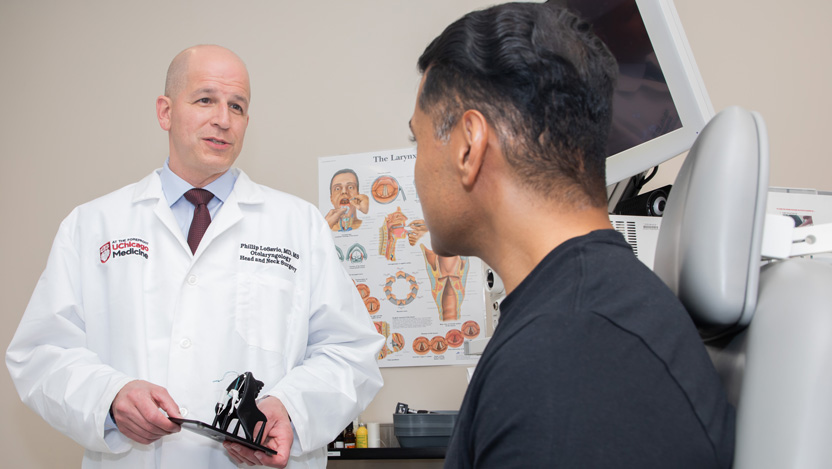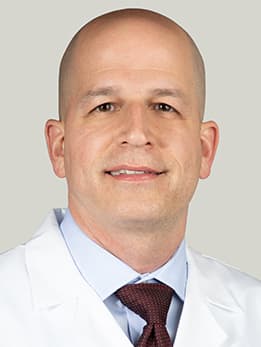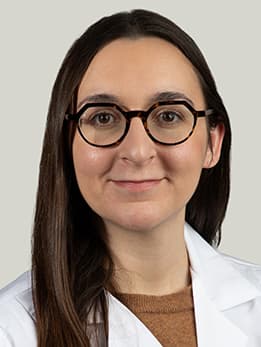Hypoglossal Nerve Stimulation

Hypoglossal nerve stimulation, is a relatively new treatment for obstructive sleep apnea (OSA) where a small, implanted device helps keep the airway open during sleep. It’s an alternative to continuous positive airway pressure (CPAP) therapy that works inside the body instead of wearing a mask. You operate the device through Bluetooth.
Surgeons at UChicago Medicine were the first in the region and among the first in the country to implant the Inspire system. We have continued to innovate and optimize the surgical procedure to provide the best possible care to our patients.
Frequently Asked Questions About Hypoglossal Nerve Stimulation
The device, called an upper airway stimulation system, stimulates the muscles that control the tongue and other soft tissues in the throat to prevent them from collapsing and blocking the airway.
The device consists of three main components:
- A small generator implanted under the skin near the collarbone.
- A sensing lead placed between the ribs.
- A stimulation lead placed in the neck muscles
During sleep, the sensing lead detects when you breathe, sending a signal to the generator. The generator then sends a mild electrical pulse through the stimulation lead to the muscles that control the tongue and other soft tissues in the throat. This causes the muscles to contract and open the airway, allowing air to flow freely into the lungs.
Hypoglossal nerve stimulation is typically recommended for people with moderate to severe obstructive sleep apnea who have not found relief from other treatments, such as CPAP therapy.
The primary FDA criteria to qualify for surgery include the following:
- Diagnosed with moderate to severe obstructive sleep apnea
- Struggle with or can’t consistently benefit from CPAP
- Not significantly overweight – can be different based on individual circumstances
- Age 18+
In addition, you must undergo a medical evaluation with your surgeon to review your past sleep study records and medical history. You will have a diagnostic evaluation with a drug induced sleep endoscopy.
- The procedure is performed under general anesthesia in the operating room.
- Your surgeon will use a surgical microscope to identify the specific fine branches of the nerve that control the tongue (hypoglossal nerve) for proper placement of the device.
- The generator is then placed under your skin and soft tissue along the right side of the chest area and a wire lead is placed in an incision on the neck.
- Most patients can go home the same day. Patients with specific medical circumstances may be observed overnight in the hospital.
You will schedule an appointment one-week post-surgery and a one-month postoperative appointment to activate your device. It’s recommended to visit your physician three to six months after surgery to check on device acclimation and programming. After the acclimation period, your physician will recommend a new home sleep test to gauge the treatment’s effectiveness. A more detailed sleep lab study can be done for cases requiring further fine-tuning or calibration. Once your care team confirms a practical treatment setting, visits are usually recommended every six to twelve months.
The device will be activated one month after surgery. Your care team will show you how to use the remote control. You must download the Inspire app on your mobile device to operate the device. This will allow you to sync your device with your health care team’s cloud-based computer platform so your doctor can monitor your progress.
The battery lasts about 10 years on average. After that, the generator needs to be changed in an Inspire tune-up procedure, but the wire leads are kept in place. This simple procedure can be done in under an hour under general anesthesia.
Patients need to refrain from heavy lifting for four to six weeks after surgery to prevent complications. After that, you may return to all normal activities, including sports.
You should discuss individually with your physician if you engage in any extreme sports, such as deep-water scuba diving, or ones that involve potential impact trauma to the area of your device, such as boxing.
Certain occupations working near very high-powered electricity or magnetic fields may be restricted. Your care team can answer specific questions.
If your provider recommends Inspire, physicians at UChicago Medicine can provide further evaluation and a second opinion on your treatment plan.
Whether we are your first or last stop for care, we encourage all patients to seek additional medical advice, ensuring you are comfortable with your care. We have the experience and specialty focus to give you a detailed and informed second opinion about your care plan.
Consider getting a second opinion if any of the following applies:
- You seek a confirming second or third definitive opinion if you have received conflicting medical advice.
- You were told your case is too complicated, or you are not a good candidate for surgery.
- You are not currently interested in surgery but want a deeper look at treatment options.
- You want a more detailed diagnostic evaluation.
Meet Our Expert Sleep Surgery Team
Convenient Locations for Sleep Surgery
Request an Appointment
We are currently experiencing a high volume of inquiries, leading to delayed response times. For faster assistance, please call 773-702-1865 to schedule your appointment.
If you have symptoms of an urgent nature, please call your doctor or go to the emergency room immediately.
* Indicates required field


